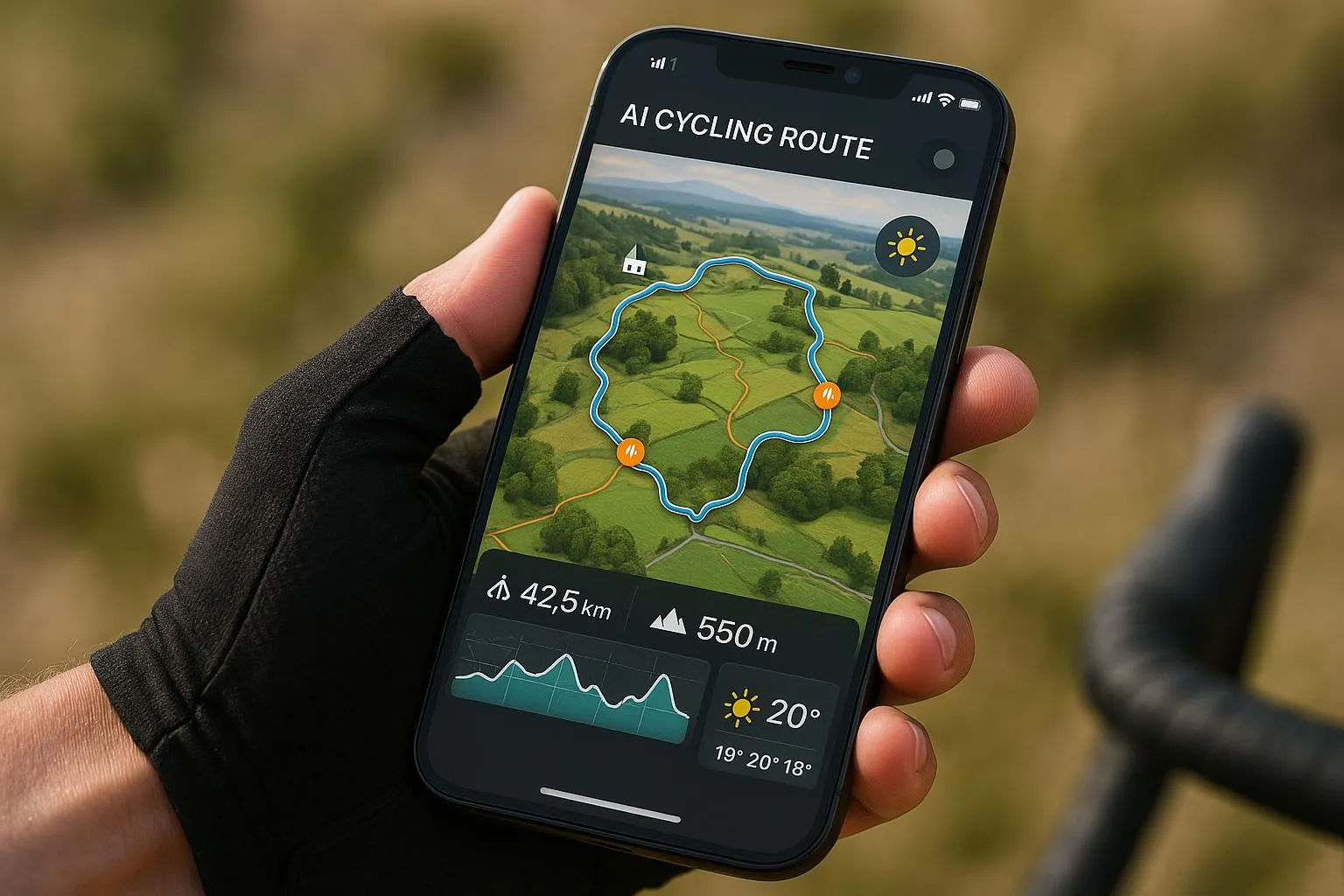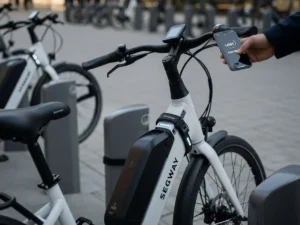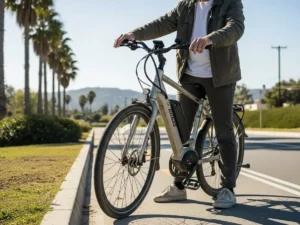The cycling tourism industry has reached an unprecedented technological tipping point in 2025, where artificial intelligence, sustainable travel integration, and advanced route planning systems are fundamentally transforming how cyclists explore the world. What was once a simple matter of packing panniers and following paper maps has evolved into a sophisticated ecosystem of interconnected technologies that enhance safety, sustainability, and discovery for cycling adventurers worldwide.
According to Hilton’s Annual Trends Report, seven in ten global travelers now enjoy being active when they travel, with one in five leisure travelers planning outdoor adventures in 2025 [1]. This surge in active travel has coincided with remarkable technological innovations that are making cycling tourism more accessible, safer, and more environmentally conscious than ever before.
The Rise of AI-Powered Route Planning and Discovery
The foundation of modern cycling tourism technology lies in artificial intelligence systems that can analyze vast datasets to create personalized cycling experiences. These sophisticated platforms consider factors ranging from individual fitness levels and preferences to real-time weather conditions, traffic patterns, and local events to craft optimal cycling routes.
Advanced route planning applications now integrate multiple data sources including elevation profiles, road surface conditions, points of interest, accommodation availability, and even local cycling culture insights. The technology goes far beyond simple GPS navigation, incorporating machine learning algorithms that adapt to individual cycling styles and preferences over time.
Modern cycling tourism platforms utilize predictive analytics to anticipate potential challenges along routes, from weather changes to road closures, automatically suggesting alternative paths or timing adjustments. This proactive approach to route management has revolutionized the spontaneity and flexibility that defines great cycling adventures while maintaining the safety and reliability that modern travelers demand.
The integration of social cycling data has created collaborative route discovery systems where cyclists can share real-time insights about road conditions, scenic viewpoints, and local recommendations. These crowdsourced intelligence networks have become invaluable resources for cycling tourists, providing authentic, up-to-date information that traditional guidebooks simply cannot match.
Sustainable Travel Integration and Carbon-Conscious Cycling
The environmental consciousness that drives many cyclists has found perfect expression in 2025’s sustainable travel technology integration. Advanced platforms now calculate and display the carbon footprint of different travel options, making it easier than ever for cyclists to make environmentally responsible choices about reaching their cycling destinations.
Train travel integration has become particularly sophisticated, with dedicated cycling tourism platforms now offering seamless booking systems that coordinate bicycle transport, accommodation, and route planning across multiple countries. The celebration of the British Railway’s 200th anniversary in 2025 has sparked renewed interest in train-based cycling tourism, with technology platforms capitalizing on this trend by creating specialized rail-cycling itineraries [2].
Digital platforms now provide comprehensive information about bike-friendly train services, including real-time availability of bicycle spaces, storage requirements, and booking procedures across different railway networks. This integration has made multi-modal cycling tourism significantly more accessible, allowing cyclists to combine the efficiency of rail travel with the freedom of bicycle exploration.
Carbon offset integration has become standard in cycling tourism platforms, with automated systems calculating the environmental impact of travel choices and offering verified offset options. These systems provide transparency about the environmental benefits of choosing cycling tourism over traditional travel methods, reinforcing the sustainable values that attract many cyclists to this form of adventure travel.
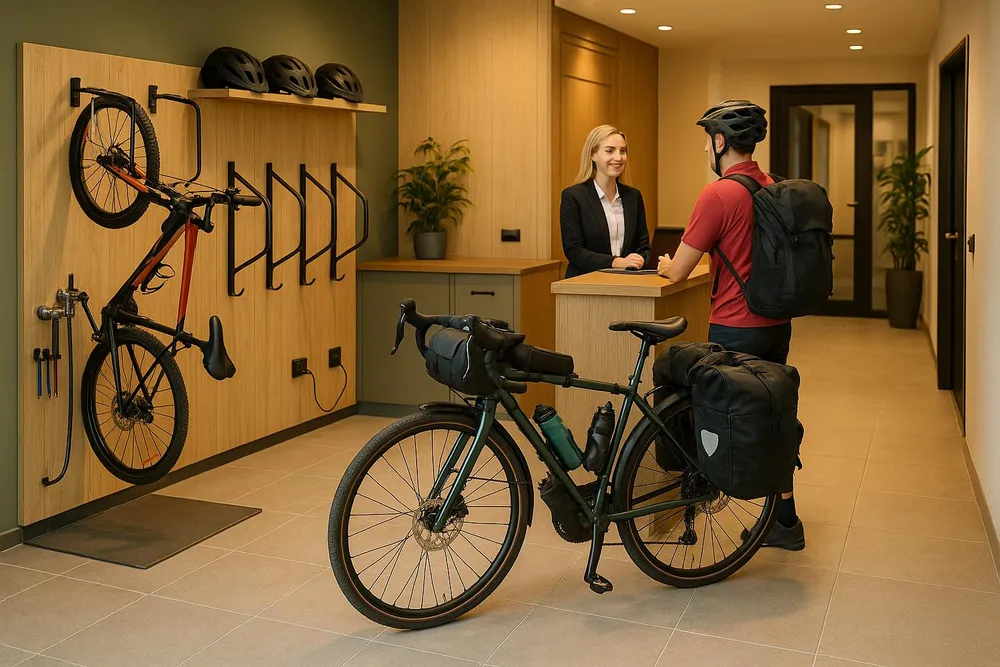
Smart Accommodation and Service Discovery
The accommodation landscape for cycling tourists has been transformed by technology platforms that specialize in cyclist-specific needs and preferences. Advanced booking systems now filter accommodations based on cycling-specific amenities such as secure bike storage, maintenance facilities, laundry services, and early breakfast options.
Geolocation technology enables real-time discovery of cycling-friendly services along routes, from bike shops and repair services to cyclist-welcoming restaurants and cafes. These platforms maintain detailed databases of service providers who understand and cater to the unique needs of cycling tourists, creating a supportive infrastructure network that enhances the overall travel experience.
Smart accommodation platforms now offer dynamic pricing based on cycling season patterns, route popularity, and local events, helping cycling tourists optimize their travel budgets while ensuring availability during peak cycling periods. The integration of weather forecasting and route planning helps travelers make informed decisions about timing and accommodation choices.
The emergence of specialized cycling hospitality networks has created communities of hosts who specifically welcome cycling tourists, offering services ranging from basic overnight accommodation to comprehensive cycling support including guided local rides, mechanical assistance, and cultural insights.
Advanced Safety and Communication Technology
Safety technology for cycling tourists has evolved far beyond basic GPS tracking to encompass comprehensive monitoring and communication systems that provide peace of mind for both travelers and their families. Advanced platforms now offer real-time location sharing, emergency alert systems, and automated check-in protocols that ensure cyclist safety without compromising the sense of adventure and independence that defines cycling tourism.
Satellite communication integration has made it possible for cycling tourists to maintain contact even in remote areas without cellular coverage. These systems provide emergency communication capabilities while also enabling social sharing and route updates that enhance the travel experience for both cyclists and their followers.
Weather monitoring and alert systems have become increasingly sophisticated, providing hyper-local forecasting that helps cycling tourists make informed decisions about route timing and safety precautions. These systems integrate with route planning platforms to suggest optimal timing for challenging sections or weather-dependent scenic routes.
The integration of health monitoring technology allows cycling tourists to track their physical condition and performance throughout extended tours, providing valuable data for pacing decisions and recovery planning. These systems can alert users to potential health concerns and suggest appropriate rest periods or medical attention when needed.
Cultural Integration and Local Discovery Technology
Modern cycling tourism technology has revolutionized how travelers connect with local cultures and communities along their routes. Advanced platforms now provide cultural context and historical information about regions, creating educational opportunities that enrich the cycling tourism experience beyond mere physical activity.
Language translation and cultural communication tools have made it easier for cycling tourists to interact with local communities, breaking down barriers that previously limited cultural exchange opportunities. These tools provide not just translation services but cultural context that helps travelers understand and respect local customs and traditions.
Local event and festival integration allows cycling tourists to time their travels to coincide with cultural celebrations, markets, and community events that provide authentic cultural experiences. These platforms maintain comprehensive databases of local events and can suggest route modifications to incorporate cultural opportunities.
The gamification of cultural discovery has created engaging ways for cycling tourists to learn about and interact with the places they visit. Achievement systems and cultural challenges encourage deeper exploration and understanding of local history, traditions, and natural environments.
Economic Impact and Industry Transformation
The technological revolution in cycling tourism has created significant economic opportunities for destinations and service providers who embrace cyclist-friendly infrastructure and services. Data analytics platforms now help destinations understand cycling tourism patterns and economic impact, enabling more effective marketing and infrastructure investment decisions.
Dynamic pricing and demand forecasting systems help cycling tourism businesses optimize their operations and revenue while providing better value and availability for travelers. These systems analyze historical data, weather patterns, and event calendars to predict demand and adjust services accordingly.
The democratization of cycling tourism through technology has opened new markets and destinations that were previously difficult to access or navigate. This expansion has created economic opportunities in rural and remote areas that benefit from cycling tourism while preserving their natural and cultural authenticity.
Technology platforms have also facilitated the growth of specialized cycling tourism services, from guided tour operators to equipment rental and support services, creating a robust ecosystem that supports both independent and organized cycling tourism.
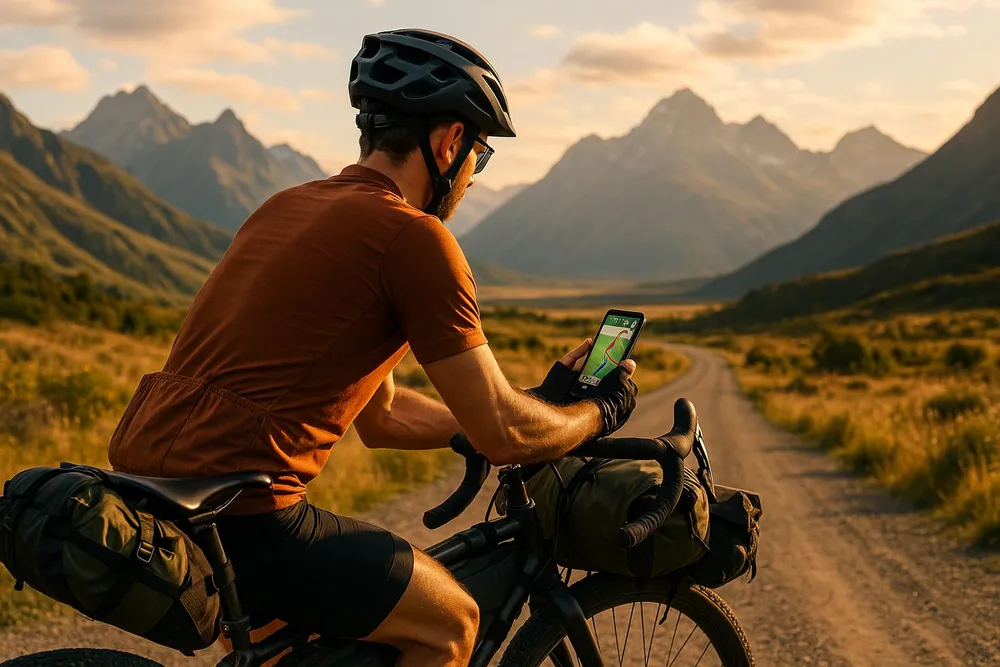
Future Innovations and Emerging Technologies
The cycling tourism technology landscape continues to evolve rapidly, with emerging innovations promising even more sophisticated and integrated travel experiences. Augmented reality applications are beginning to provide real-time information overlays that enhance route navigation and cultural discovery without requiring constant attention to mobile devices.
Artificial intelligence personal assistants specifically designed for cycling tourism are being developed to provide conversational interfaces for route planning, problem-solving, and local discovery. These systems will learn individual preferences and travel styles to provide increasingly personalized recommendations and support.
Blockchain technology is being explored for creating secure, decentralized systems for accommodation booking, service verification, and payment processing that could reduce costs and increase trust in cycling tourism transactions.
The integration of Internet of Things (IoT) sensors along popular cycling routes promises to provide real-time data about road conditions, traffic, weather, and safety that will further enhance route planning and safety systems.
Conclusion
The cycling tourism technology revolution of 2025 represents a fundamental shift in how we approach adventure travel, combining the timeless appeal of bicycle exploration with cutting-edge digital innovations that enhance safety, sustainability, and cultural connection. As these technologies continue to evolve and integrate, they promise to make cycling tourism more accessible to diverse populations while preserving the authentic experiences and environmental benefits that define this remarkable form of travel.
The future of cycling tourism lies not in replacing the fundamental human experience of exploration and discovery, but in using technology to remove barriers, enhance safety, and create deeper connections between travelers and the places they visit. As we move forward, the most successful cycling tourism technologies will be those that seamlessly integrate into the travel experience, providing support and enhancement without overwhelming the simple joy of exploring the world by bicycle.
For more insights on cycling and technology, explore our comprehensive guides on Urban Cycling Infrastructure Revolution: How Smart Cities Are Transforming the Cycling Experience in 2025, Gravel Cycling Technology Revolution: How Innovation Is Transforming Adventure Cycling in 2025, Cycling Apps Revolution: How Smart Technology and AI Are Transforming Every Aspect of Your Ride in 2025, and Sustainable Cycling Manufacturing Revolution: How Eco-Friendly Materials and Green Production Are Transforming the Industry in 2025.
Explore additional resources on Cycling Tourism 2025: Trends, Innovations, and Top E-Bike Routes, Smart Cities and the Impact on Bicycle Tourism, Cycling Tour Trends For Eco-Tourism In 2025, and Top Trends Revolutionizing Two-Wheel Travel.
